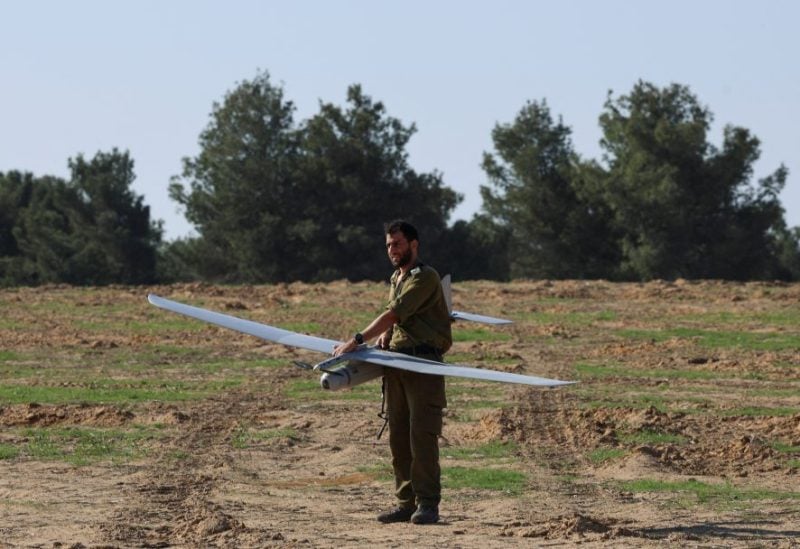
An Israeli military tactical drone operator prepares to launch a drone near the Gaza border, amid the ongoing conflict between Israel and the Palestinian Islamist group Hamas, in southern Israel, December 30, 2023. REUTERS/Violeta Santos Moura
Israeli jets intensified attacks on central Gaza on Sunday, residents and medics said, as battles raged through the rubble of towns and refugee camps in a war that Israeli Prime Minister Benjamin Netanyahu said would take “many more months” to end.
Netanyahu’s comments signal no let up in a campaign that has killed many thousands and levelled much of Gaza, while his vow to restore Israeli control over the enclave’s border with Egypt raises new questions over an eventual two-state solution.
Air strikes pounded al-Maghazi and al-Bureij in the centre of the Palestinian enclave, killing eight people in one house and driving more to flee to Rafah on the border with Egypt from front lines where Israeli tanks are battling Hamas fighters.
A Red Crescent video published on Sunday showed the chaotic aftermath of strikes in central Gaza, as rescuers worked in the dark to carry an injured child from smoking rubble.
The stated goal of Israel’s military is to eliminate Hamas, the Palestinian militant group that launched a surprise cross-border assault on Israeli towns on Oct. 7, killing 1,200 people, mostly civilians, and grabbing 240 hostages.
Israel’s air and artillery bombardment has killed more than 21,800 people according to health authorities in Hamas-run Gaza, with many more feared dead in the rubble, and pushed nearly all its 2.3 million people from their homes.
Palestinian health ministry casualty figures do not differentiate between fighters and civilians but the ministry has said 70% of Gaza’s dead were women and under-18s. Israel disputes Palestinian casualty figures and says it has killed 8,000 fighters.
The war and lack of supplies has left 40% of Gazans at risk of famine, the Gaza director of the U.N. agency for Palestinian refugees said on social media on Saturday.
Israel blockaded most food, fuel and medicine after the Oct. 7 attack. It said on Sunday it was ready to let ships from some Western countries deliver aid directly to Gaza’s shores after security checks in Cyprus.
People on Sunday sat outside their makeshift tents in Rafah, wedged among the ruins of houses destroyed by Israeli bombardment, as some sought food or clean water, Reuters photographs showed. In central Gaza, dark smoke rose above the fighting
The United States, Israel’s main ally, has urged it to scale down the war and European states have signalled alarm at the extent of Palestinian civilian suffering.
However Netanyahu’s comments on Saturday, when he said he would not resign despite opinion polls showing his government is broadly unpopular and defended his security record despite the Oct. 7 attack, indicate there will be no easing any time soon.
He said the “the war is at its height” and Israel would have to retake control of Gaza’s border with Egypt – an area now crammed with civilians who have fled the carnage across the rest of the enclave, leading aid agencies to set up “tent cities” for displaced families sleeping rough on the streets.
Retaking the border could also constitute a de facto reversal of Israel’s 2005 withdrawal from Gaza, raising new questions over the future of the enclave and prospects for a Palestinian state.
In his last comments as Israeli Foreign Minister before switching to the energy portfolio on Sunday, Eli Cohen said the border was the likely source of weaponry Hamas had obtained over recent years.
Senior Palestinian Authority official Hussein al-Sheikh in the Israeli-occupied West Bank said via social media that Israel taking over the border was evidence of a decision “to completely return the occupation”.
Egypt’s Foreign Ministry did not immediately comment on Israeli plans to retake the border area or on whether Hamas weapons had entered Gaza from Egypt.
“We moved here from Khan Younis on the basis that Rafah was a safe place. There is no space in Rafah as it is overcrowded with displaced,” said Umm Mohammed, 45, a displaced Palestinian woman sheltering by the border.
“If they control the border where will people go?” she asked, saying this would be “a disaster”.
The war risks morphing into a wider regional conflict involving Hamas ally Iran and groups Tehran supports across the Middle East.
Israel and Lebanon’s Iran-backed Hezbollah have exchanged regular cross-border fire, with the Israeli military saying it struck targets in Lebanon on Sunday. Israel has hit Iran-linked targets in Syria. And Iran-backed groups have attacked U.S. targets in Iraq.
Yemen’s Iran-aligned Houthi group, which has been attacking shipping in the Red Sea for weeks in what it calls a response to Israel’s war in Gaza, attacked a Maersk cargo ship on Saturday and Sunday, the U.S. military said.
U.S. naval helicopters sank three of the four small boats the Houthis had used in Sunday’s attack and drove the fourth back to shore, the military said.
Israel says 174 of its military personnel have been killed in the Gaza fighting but that its operations are making progress, including by destroying some Hamas tunnels under the enclave.
Hamas media reported on Saturday that Abdel-Fattah Maali, a senior member of the group’s armed wing, was killed in an Israeli strike in Gaza. It said Maali, originally from the West Bank, was freed during a 2011 prisoner swap and expelled to Gaza. The reports did not specify when he was killed.
Palestinian media reported that a strike on Saturday night had killed a senior cleric, Sheikh Youssef Salama, who had acted as religious affairs minister in Gaza before Hamas took over the enclave.
Hamas and Islamic Jihad – both sworn to Israel’s destruction – have said they continue to target Israeli forces operating in the enclave.